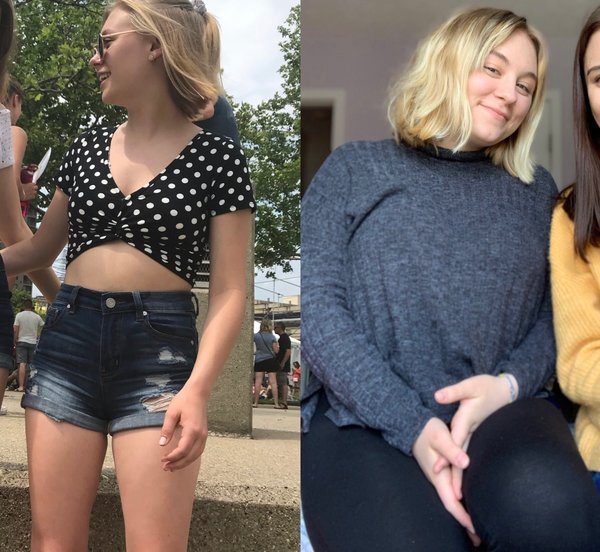Sophomore year of high school was the first time I became obsessed with the scale. It was at this point when I was at my heaviest that I willingly took my first step onto the metal square in my bathroom, and it was then when I decided to devote my life to eating healthier, working out, and feeling better about myself.
Flash forward to now, and a part inside of me is obsessed with the numbers on that scale. If the number is lower, I know that my day will be a lot easier, and I will feel confident and happy. But if the number is higher, then the entire day is ruined, and I feel like everything I'm doing is wrong.
This is how I've felt ever since that one day during sophomore year. I've restricted and cut off many foods that I used to love, because I now consider them my fear foods, with carbs being enemy No. 1. I've relied on the numbers on the scale as my source of happiness for the day, and continuously stepped on the metal square numerous times in one day to make sure I wasn't "overdoing it." I've made calorie-counting my method as a way to navigate how I would eat my meals in order to gain the least amount of pounds. I've avoided lunch and dinner plans with friends and family, because I couldn't muster up the courage to eat something out of my comfort zone. I've resorted to using laxatives or exercise as a way to get rid of any heavy meals that I had eaten throughout the day as a way to make myself feel less disgusting. I've felt the guilt and the shame when I noticed that I put on a few pounds, because I felt like I was losing control.
My lowest point of my disorder was the summer of 2018, where a typical day of eating for me consisted of nuts as my breakfast and lunch, something light for dinner, such as a smoothie or some celery with peanut butter, and then more nuts as my nightly snack. When it had gotten to this point, my parents began to sign me up for therapy, and I was terrified. I didn't want to accept that something was wrong with me, and I was afraid of what was about to come next. My therapist and nutritionist were giving me helpful tips on how to have a balanced diet that would support my health, but I was more concerned about what number would be on the scale the next morning.
But if there's one thing I've learned since going through recovery, it's that it's not about being perfect. It's about honesty and acceptance.
After spending more time with my therapist and with family and friends talking about my eating disorder, I eventually came to terms with and acknowledged all of the unhealthy habits I was doing to my body for so long. It was suddenly noticeable how much of a grip this disorder had over me, my thought process, and the choices I made each day. I was able to take a few steps back and realize how physically and emotionally tiring it was to strive to be something that wasn't even good for my body in the first place. I learned how to separate which thoughts inside my head were coming from me or my eating disorder, and realized that the eating disorder thoughts were the ones that were controlling over every bite I had consumed that day, or reminding me of how guilty I should feel about the food I had eaten.
But the most important thing that I've learned in this process is that I'm not alone. I've read books written by others and watched YouTubers post their stories online about how they've fully recovered from their eating disorders, and I realized that they were also experiencing all of the same things I've been doing and feeling. I've talked to friends and family about my experience, and they've shown nothing but strong support and welcoming arms in trying to help me get through this painful journey. I've learned that some of my peers have also had or are still in the recovery process for their eating disorders, which I had never known about before in the past. Knowing that I'm not alone in feeling the emotions that I do has helped me tremendously and has inspired me to keep progressing through this recovery period.
Even now during the recovery process of my eating disorder, I'm still struggling. After six months, I'm still having those days where I stick to those go-to meals that I know won't make me feel disgusting, or where I'll cut back on certain foods if I "let myself go" earlier on in the day. I'll still experience those familiar feelings of shame and guilt, wondering if I'll ever make it to that point of full recovery just like the others I've witnessed. But I'm not perfect, I'm going to have those slip-ups from time to time and I can't continue to let those define me. Recovery is not perfect, it's not linear, and it doesn't happen overnight.
If you're still in recovery from an eating disorder or are still struggling, you're not alone. Find the people you know you can go to for anything, because talking about it helps release all of the emotional baggage you've been keeping inside, and will also maybe put together things about yourself that you hadn't known before. Take one day at a time, and remember that each step is important as the last one. Seek proper help, whether it's through a therapist, your best friend, your roommate, or your parents, because suffering in silence will only make the disorder become stronger.
Most importantly, don't forget how important you are, and do NOT let this disorder define you. For the longest amount of time, I viewed myself as weak for not being able to eat properly or for taking four years to actually recognize my issue and take action. But you are anything but weak, you are an individual with talents, dreams, accomplishments, and much more.
My eating disorder wasn't something that I decided to choose to have one morning, it was something that eventually snuck up on me when I got lost in counting calories and how many days I needed to exercise. But this disorder is something that I chose to attack head-on, in order to bring the light back into my life that I once had. I know now that it's not going to be a quick and easy recovery process, but I also know that it's not impossible, and that one day I'll be able to smile at the number at the scale, eat the foods I want to without feeling guilt, look in the mirror and feel beautiful, and feel like myself again.
If you or a loved one is currently struggling with an eating disorder, or if you would like more information about the National Eating Disorders Association and NEDA appreciation week, visit their website at https://www.nationaleatingdisorders.org/.
- Yes, Eating Disorder Recovery Is Possible ›
- What Eating Disorder Recovery Taught Me ›
- Eating Disorder Relapse And Recovery Are A Never-Ending Battle ›
- How I Recovered From an Eating Disorder I Didn't Think Was Real ... ›
- 7 Secrets to Eating Disorder Recovery ›
- Stages of Recovery | National Eating Disorders Association ›
- What I Ate Wednesday + National Eating Disorder Awareness Week ... ›
- Allure Teams Up With NEDA for National Eating Disorder ... ›
- National Eating Disorders Awareness Week | National Eating ... ›


















